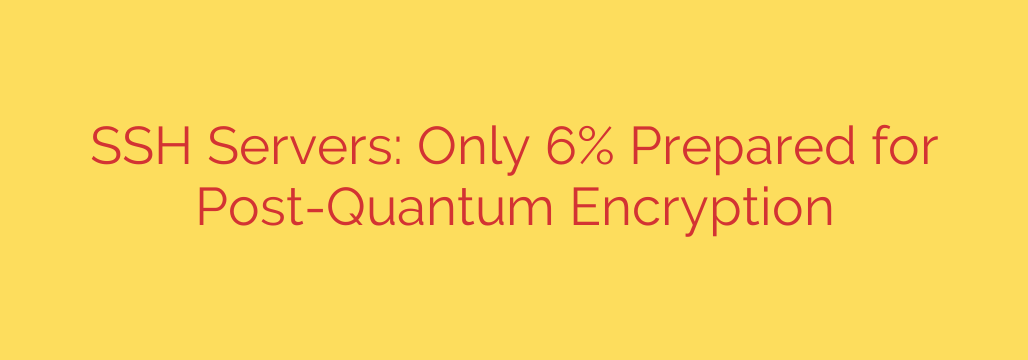
The Quantum Countdown: Why 94% of SSH Servers Are Vulnerable
The digital world runs on trust, and for decades, that trust has been secured by powerful encryption. Secure Shell (SSH), the protocol that underpins secure remote logins, file transfers, and system administration across the internet, is a cornerstone of this security. However, a seismic shift in computing is on the horizon, and new research reveals that our critical infrastructure is dangerously unprepared.
A startling analysis of the internet’s publicly accessible SSH servers shows that an estimated 94% are not configured to use post-quantum cryptography (PQC). This leaves a massive portion of the internet’s backbone vulnerable to a future threat that security experts are taking very seriously: the quantum computer.
The Looming Threat: Harvest Now, Decrypt Later
Quantum computers operate on principles that will allow them to one day solve the complex mathematical problems that current encryption standards rely on. Algorithms like RSA, ECDSA, and DSA, which have protected our data for years, will be rendered obsolete and breakable.
While a cryptographically relevant quantum computer may still be years away, the danger is already here. Malicious actors and state-sponsored groups are actively engaged in a strategy known as “Harvest Now, Decrypt Later.” They are capturing and storing vast amounts of encrypted data today, betting on the fact that they will be able to decrypt it in the future once quantum computers are operational.
This means that any sensitive data—from intellectual property and government secrets to personal credentials and financial information—transmitted over a vulnerable SSH connection today could be exposed tomorrow.
The State of SSH Security: A Sobering Reality Check
The core of the problem lies in slow adoption rates for new, quantum-resistant algorithms. Despite significant progress in the field of post-quantum cryptography, the vast majority of system administrators have not updated their servers to use them.
The findings are clear:
- Only 6% of SSH servers support PQC algorithms, leaving the rest reliant on legacy methods.
- The transition requires proactive effort, including software updates and configuration changes.
- Many organizations are unaware of the risk or believe the threat is too far in the future to warrant immediate action—a dangerously flawed assumption.
The Solution is Here: Embracing Post-Quantum Cryptography
Fortunately, the cybersecurity community has been preparing for this moment. The U.S. National Institute of Standards and Technology (NIST) has been leading a multi-year process to standardize a new generation of PQC algorithms designed to withstand attacks from both classical and quantum computers.
One of the most popular SSH implementations, OpenSSH, has already integrated a PQC hybrid solution starting with version 9.0. It uses a combination of a traditional algorithm (X25519) and a quantum-resistant one (NTRU Prime, specifically [email protected]) for the key exchange. This hybrid approach ensures robust security today while providing a bridge to a fully quantum-resistant future.
The technology is available. The challenge is now one of implementation.
Actionable Security: How to Secure Your SSH Servers Today
Waiting is no longer an option. System administrators and IT security professionals must act now to future-proof their infrastructure. Here are the essential steps to protect your SSH servers from the quantum threat.
Audit Your Infrastructure: The first step is to identify all SSH servers your organization operates. Determine which versions of SSH software they are running and what cryptographic algorithms are currently enabled in their configurations.
Update to the Latest OpenSSH Version: To gain access to post-quantum capabilities, you must be running a modern version of OpenSSH. Ensure your servers are running OpenSSH 9.0 or newer. This is the minimum requirement for enabling the PQC hybrid key exchange method.
Enable Quantum-Resistant Algorithms: Updating the software is not enough; you must also change the configuration. In your server’s
sshd_configfile, you need to ensure the PQC-hybrid key exchange algorithm is prioritized. The default configuration in recent OpenSSH versions is a good start, but it’s crucial to verify it’s active.Test and Verify Your Configuration: After making changes, thoroughly test your SSH connections to ensure everything functions correctly. Use verbose connection commands (
ssh -v) from a compatible client to verify that thesntrup761x25519-sha512key exchange method is being successfully negotiated.
The transition to a post-quantum world has already begun. The “Harvest Now, Decrypt Later” strategy means that today’s encrypted traffic is the target. By taking proactive steps to update and reconfigure SSH servers, organizations can protect their sensitive data from the security challenges of tomorrow. The time to act is now.
Source: https://datacenternews.asia/story/only-6-of-ssh-servers-ready-for-post-quantum-encryption








